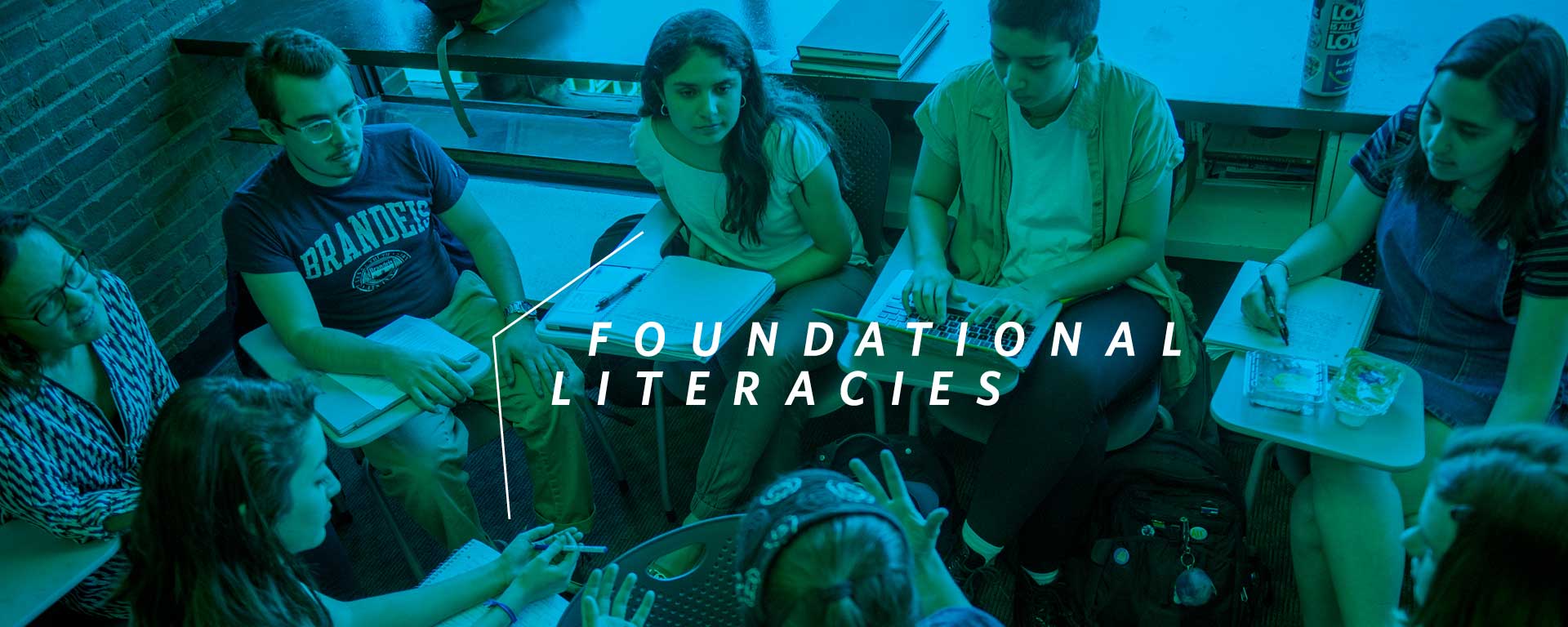
Foundational Literacies
The Brandeis Core enables you to focus on learning goals central to your academic and professional success: becoming an effective communicator, researcher and critical thinker. No matter your course of study or professional interests, these bedrock skills will prepare you for a life of learning and mastery.
With the exception of quantitative reasoning, you can fulfill these foundational literacies through courses and/or equivalent experiences within your major.
Writing Intensive
The writing intensive requirement teaches writing as a mode of learning, not simply as a way to articulate what is learned.
Students become familiar with the conventions and intellectual traditions of the discipline of their major and use writing to acquire knowledge in that discipline. All students will satisfy the writing intensive requirement as defined in the requirements for the major.
Through writing assignments, opportunities for revision, focused writing instruction and review of exemplary writing in the discipline, writing intensive assignments further develop writing skills necessary for successful written communication in specific fields of specialization. Students will learn to evaluate and employ disciplinary writing conventions, styles and formats, and how to convey arguments and use evidence and rhetorical strategies for appropriate audiences.
Oral Communication
The oral communication requirement enhances students' ability to present, communicate and listen effectively in a range of contexts, critically evaluate orally presented information and arguments, and consider specific techniques for using oral language as a communication tool with confidence.
This foundational literacy requirement in the major recognizes that students need to be prepared with varied concrete skills for use in communicating effectively in various fields of study, including (but not limited to) oral presentations, interviews, active debate, discussion facilitation and critique. All students will satisfy the oral communication requirement as defined in the requirements for each major.
Digital Literacy
The ability to engage in the digital world plays an increasingly important role in intellectual life. Every discipline has been affected by the digital revolution in its own way.
Students will master the critical digital resources and techniques relevant to the scholarly or creative endeavors of their discipline. All students will satisfy the digital literacy requirement as defined in the requirements for the major.
Quantitative Reasoning
All students will take one course that is designated as meeting the quantitative reasoning requirement, which was established to develop student' ability to collect, summarize and analyze numerical data; to make abstract concepts operational; and to think critically about the accuracy and soundness of conclusions based on data or on mathematical models.
Foundational Literacies Committee
| Name | Foundational Literacy | Department |
|---|---|---|
| Lisa Rourke | Writing Intensive | University Writing Program |
| Robert Walsh | Oral Communication | Theater Arts |
| John Burt | Digital Literacy | English |
| Kene Piasta | Quantitative Reasoning | Biology |
-
Academics
- New Student Orientation
- First-Year Experience
- Academic Services
-
Brandeis Core Requirements
- First-Year Seminar
- Foundational Literacies
- Schools of Thought
- Global Engagement
- Health, Wellness and Life Skills
- Majors and Minors
- Academic Fellowships
- Study Abroad
- Brandeis Summer School
- Teaching, Mentoring and Service Awards
- Cohort Programs
- Peer Support and Tutoring
- Student Resources
- About
- Home
- Office of the Provost